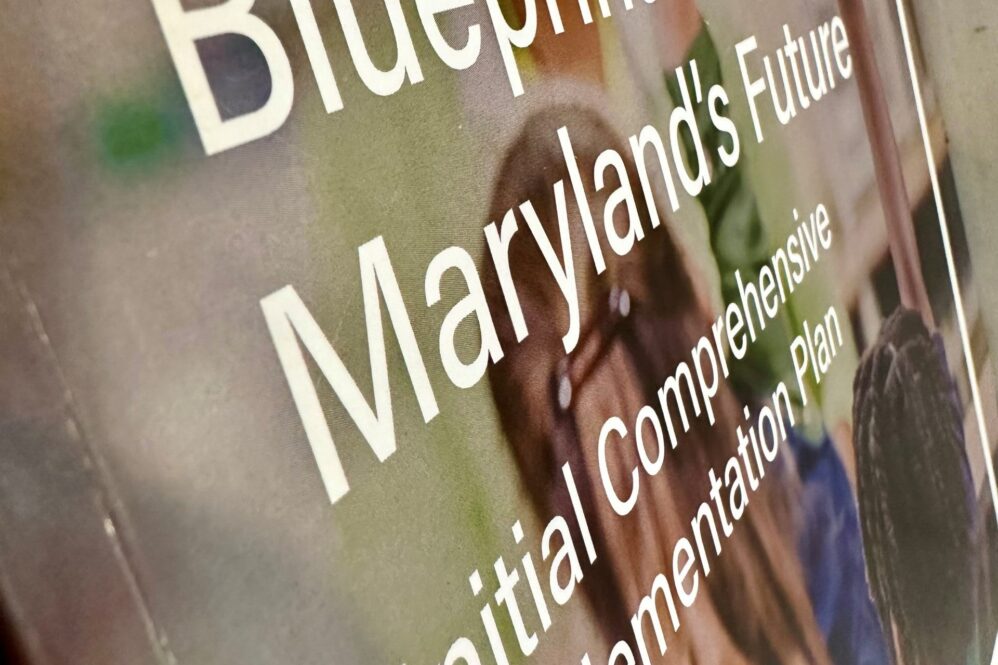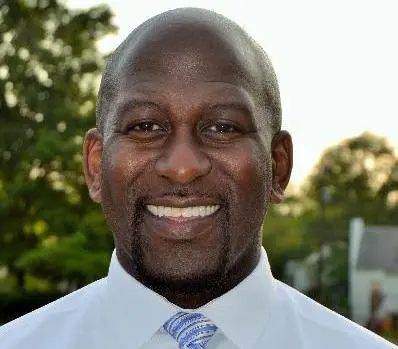MARYLAND MATTERS: Maryland lawmakers should provide more guidance and flexibility to county governments as they work to find space in tight budgets for far-reaching public education reforms, a leading advocacy group said.
The Maryland Association of Counties(MACo) made a series of recommendations to ease pressures on the effort to implement the 10-year Blueprint for Maryland’s Future education reform plan in a recent letter addressed to Gov. Wes Moore (D) and the legislature’s presiding officers.
“The Blueprint applies a one-size-fits-all approach to education investment and implementation that does not account for our state’s diverse local government capacities, processes, and abilities,” according to the letter signed by MACo Executive Director Michael Sanderson and Howard County Executive Calvin Ball (D), president of the organization. “As we move deeper into implementation, the diverse systems, constraints, and structures counties must work within become more apparent, especially financially.”
Sanderson said in an interview Monday that the goal is not to go back and legislate the Blueprint law, but to inform lawmakers and the public of the continuing challenges to funding the Blueprint on a local level.
One proposal, Sanderson said, is for the legislature to provide a more comprehensive cost analysis detailing how much Blueprint funding is mandated in local budgets. In addition, that analysis should take into account fluctuating school enrollments, he said.
Some counties received notice about how much money would be needed for Blueprint reforms in the next year just a week before budgets were approved last spring, Sanderson said. Most county officials release preliminary budgets between December and February. The General Assembly’s 90-day session is set to begin Jan. 10.
“What we tried to do was harvest the things we’ve been hearing at the local level,” he said. “The idea of more clarity in the funding projections and estimates and having that in a more timely and clear way [helps] everybody…as they go through their budgeting process.”
The Blueprint plan continues to be implemented based on its priorities: expanding early childhood education, hiring and retaining high-quality and diverse teachers, preparing students for college and technical careers and providing additional resources for students in need.
The Blueprint Accountability and Implement Board, an independent body established by the legislature to oversee the initiative approved some updates this summer. One of the board’s duties is providing recommendations to the General Assembly and the governor on proposed changes to the Blueprint law. The panel is set to meet next on Thursday.
The Blueprint law states that schools must implement a $10,000 salary increase for teachers who are designated as National Board Certified, and an additional $7,000 salary increase for certified teachers who work in low-performing schools.
MACo proposes those salary figures should be switched: $7,000 for all teachers certified, and an additional $10,000 for certified teachers in low-performing schools.
Brianna January, associate director of policy for MACo, said there still remains “a universal concern” about a requirement for school systems to raise minimum annual teacher salaries to $60,000, which must be done by July 1, 2026, according to the law.
January said county leaders are concerned the salary increase “will kind of pinch all the other staff positions into an upward trajection for their starting salaries.”
Carter Elliott, a spokesperson for Moore, said in an email Monday that “county leaders are important partners and [the governor] appreciates them stepping up to share their thoughts about the Blueprint and how to ensure its success going forward. The Moore-Miller Administration is looking forward to engaging in further conversation to ensure that all of Maryland’s children have access to a world class education.”
‘More flexibility’
Some of the other MACo recommendations for state leaders are:
- Provide a specific cost analysis between the state and counties to fund dual enrollment programs at community colleges.
- Offer greater flexibility for counties to utilize certain spaces such as libraries and community centers to provide prekindergarten instruction. Such spaces may be available but aren’t an option under the law because each would need “the presence of a school administrator, front desk person, and on-duty nurse.”
- Consider best practices for expedited or alternative teacher certification without lessening the standard for high-quality teachers.
“To best ensure successful implementation of the Blueprint, county governments are seeking a more comprehensive cost analysis and investment from our State partners,” Ball said in an emailed statement. “County governments are funding partners for our local Boards of Education and have minimal oversight on how taxpayer dollars are spent. By having local costs required by the Blueprint clearly defined by the State, and transparently shared with the public, we can all have smoother budget processes and increased collaboration during our annual local budget cycles.”
Some Blueprint supporters, such as Michelle Corkadel, president of the Maryland Association of Boards of Education, said equity must remain a focal point in the plan.
The state Board of Education continues to review a possible revision to the “college and career readiness,” or CCR, standards that are part of the Blueprint plan. Current law states that students “meet or exceed” the standard based on standardized test scores. Under the proposal, students could pass the standard if their grade-point average is 3.0 or higher by the end of 10th grade.
Corkadel said there should be a more holistic approach to aide students who have a focus on career programs.
“It seems to me that we should be including more flexibility in the arena of those students who have chosen a career path. We know that the state does not allow you to sit for your cosmetology license, which would be the ultimate in verifying that your college and career ready. It cannot occur until you’re 18 years old,” said Corkadel, a member of the school board in Anne Arundel County, where schools provide cosmetology training. “I do think that closing our opportunity gaps is one of the desired outcomes of Blueprint and we need to make sure that we are mindful of that. We are hopeful that the decisions we make are going to include the perspectives of all of us.”










